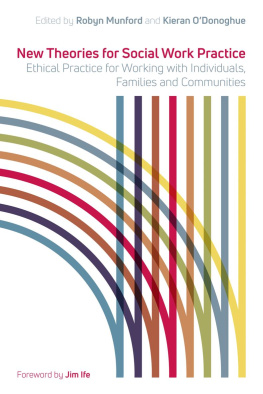Columbia University Press
Publishers Since 1893
New York Chichester, West Sussex
cup.columbia.edu
Copyright 2008 Columbia University Press
All rights reserved
E-ISBN 978-0-231-51153-7
Library of Congress Cataloging-in-Publication Data
Gitterman, Alex
The life model of social work practice : advances in theory and practice / Alex Gitterman and Carel B. Germain.3rd ed.
p. cm.
Includes bibliographical references and index.
ISBN 9780231139984 (cloth : alk. paper)ISBN 9780231511537 (ebook) 1. Social case work. 2. Human beingsEffect of environment on.
I. Germain, Carel B. II. Title.
HV43.G47 2008
361.32dc22 2007053008
A Columbia University Press E-book.
CUP would be pleased to hear about your reading experience with this e-book at .
References to Internet Web sites (URLs) were accurate at the time of writing. Neither the author nor Columbia University Press is responsible for URLs that may have expired or changed since the manuscript was prepared.
This book is dedicated to Professor Carel Bailey Germain, who died on August 3, 1995, just as we were editing the final manuscript of the prior edition.
Our collaboration began in 1972 as faculty colleagues developing the first integrated practice course at the Columbia University School of Social Work. This led to a twenty-three-year writing collaboration and close friendship. The effort to develop and express our ideas about practice forged an enduring bond between us.
Professor Germain was internationally recognized for her brilliant scholarship. She drew on numerous academic disciplines to develop ideas about human ecology. Her body of work reflects an uncommon intellect and erudition. She bequeaths a lasting gift to the profession.
Professor Germain held fast to her ideas, never cutting her cloth to suit the fashion of the day. She was graceful, gentle, and gallant. Her understated wit was illuminating and often trenchant.
The epilogue in our second edition ended with And so our journey continues! Without Carel the journey has been lonelier, but her originality, powerful ideas, and loyalty have been sources of continuing strength.
Alex Gitterman
For the authors, the first edition of The Life Model of Social Work Practice symbolized a long, adventurous journey. It began in 1972 at the Columbia University School of Social Work when we and another colleague, Mary Funny Goldson, were asked by the dean to develop a plan for the first year of social work practice courses. Earlier the faculty had decided to restructure the total curriculum to take into account emerging knowledge, new human needs, and developments occurring in practice itself as agencies sought to meet the challenges of that era. This led to our effort to reconceptualize practice and to develop an integrated social work method. Out of this joint work on a first-year practice curriculum came our further collaboration in workshops, consultations, and writing.
We found that ecological ideas helped us to understand how each of us became a source of learning for the other. Sometimes our different professional traditions, knowledge base, and practice experiences felt like barriers to mutual understanding, but actually facilitated and enriched the development of our ideas. The first edition represented a beginning attempt to work out the dimensions of integrated method practice with individuals, families, groups, social networks, and organizations. Our ideas rested on the assumption that there are many common skills in working with people, no matter on what level people are organized. The first edition also attempted to identify distinctive skills such as those used in forming groups or influencing organizations. The common skills, as well as the distinctive ones, were presented within an ecological perspective that offered a dual, simultaneous focus on people and environments. These skills were presented within the context of underlying diverse theories and knowledge at each level of human organizationindividuals, families, groups, bureaucratic systems, social networks, and the physical environment.
In the twenty-seven years since the publication of the first edition of The Life Model of Social Work Practice, and in the eleven years since the publication of the second edition, there have been dramatic changes in the profession and in the societal context of new social problems, new populations, and new public attitudes. Social workers today deal with profoundly vulnerable populations, overwhelmed by oppressive daily struggles with poverty, discrimination, and various life circumstances that they are powerless to control. Social workers in the 2000s confront daily the devastating impact of homelessness, substance abuse, chronic mental disorders, child abuse, unemployment, family and community violence, and AIDS and other grave illnesses. While social problems are growing more intractable, resources to mitigate them continue to decrease. In this new edition we respond to these pervasive changes and present a more fully developed life-modeled practicea practice modeled on natural life processes. While retaining and refining the core of our previous work, we make use of new concepts and new content. We believe this book provides social work practitioners and students with the necessary knowledge base and practice guidelines to deal with the many professional, societal, theoretical, empirical, and ethical issues they face.
We remain committed to our original conceptions and have broadened and deepened them. The ecological metaphor continues to provide concepts that illuminate the continuous exchanges between people and their environments. In the second edition, we adopted a life course of human development and functioning. In this edition, we continue to develop the life course formulation. In contrast to traditional stage models of development, this formulation takes into account diversity in race, ethnicity, sex, age, socioeconomic status, sexual orientation, and physical/mental challenges, and environmental forces within historical, societal, and cultural contexts. Life course is a multidisciplinary formulation (in anthropology, social psychology, social history, biology, psychiatry, and sociology), adapted here for social work. We use life course to replace the traditional, linear life cycle models and their assumption that emotional and social development proceed in fixed, sequential, universal stages without reference to the diversity of life experience, culture, and environments.
In this edition we further develop an integrated practice. We continue to believe that professional specialization should not determine whether a client receives individual, family, group, or community services. Rather, the service should be based on client needs and preferences. Two formulations are particularly helpful in developing an integrated life-modeled practice. The first, degree of client choice, differentiates common professional methods and skills in the initial phase by how much choice an individual, family, or group has in accepting or rejecting a social work service (i.e., whether the client sought the service or an agency offered or mandated a service) rather than by a particular modality. The second,






